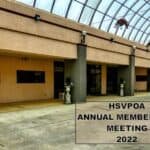At the July 7, 2021 Board Discussion Session, Board Director Pam Avila brought up the issue of Hot Springs Village Meeting Facilities.
POA Buildings are Underutilized
Avila said we have POA meeting facilities that “sit empty, day after day, after day. There are organizations throughout the Village that need meeting space. These organizations are using churches, real estate offices, etc. because the POA charges too much for their budgets. They are nonprofits and don’t have a lot of money. They all say, ‘for what the POA charges, we’ll go find someplace that is less expensive.’ I don’t understand why it makes sense that we pay for these buildings [maintenance] and some of them we pay to staff, but we are willing to let them sit empty. Help me understand that.”
Director Omohundro said, “Villagers would like to hear. This building is a good example. [Ponce de Leon Center] Do we have people here all day long or what?”
Outdated Buildings
Stephanie Heffer, Director of Programs and Operations said, “a lot. We use this one. We’ve begun to sort of shift because we do have a lot of empty space. To utilize this one more fully, we’ve started to shift some of the meetings – especially the paid meetings to this facility or the free meetings (meaning our committee meetings and things like that) trying to push them back to the Coronado Center. I would say that it’s not just a matter of cost though, Pam. It’s really not. We have not spent the money to improve our spaces, to improve our technology, or to even compete with some of the…You can go into the Trademark Facility. It’s phenomenal. It’s beautiful. It’s inexpensive and it’s much more inviting to be in than our Coronado Center room A. It’s just not the same thing. It’s partly about cost but, it is also partly about we’ve just not kept up.”
Corry said, “Stephanie did you say technically we don’t have… at say the Coronado Center…”
Heffer said, “we can do what we need to do and Paul and Dakota are amazing at keeping us running. It is just at, even down to furnishings and tables…we just don’t have quite the equipment that you have in a new facility. We just haven’t continued to improve.”
Director Gary Belair inquired, “what’s missing?”
IT Manager, Paul Moore, said, “at Coronado Center, the PA system is a 1985 model [Moore said something about bubble gum and duct tape]. The connections that are up on stage were put there in about ’83. It’s metal piping that has broken off at the ceilings. It’s things like that. The projection system we have in there was put in there in the ’80s. Again, it’s a fold-down screen. We’re behind 25 years.”
Belair asked if there were wireless alternatives.
Moore said, “there are all kinds of things we can do and look at and propose different methods and costs, but as far as being [indecipherable], it is what it is. We’re over 20 years behind on technology and things that are just commonplace at other places.”
Heffer said if a presenter comes in with a Mac Book and needs a certain kind of connection and they are normally used to plugging into a wall. We just don’t have the technology. I mean, ‘you bring a Mac Book in and we look at you like, oh my God, you’ve got two heads,’ because we don’t really have quite what we need to get you…”
Moore said, “that’s why I keep my bag of adapters.”
Heffer said, “then you have to have a Paul on hand, which is not normal, either. Then you are paying a tech guy to sit there at a meeting to help manage. It’s just unheard of.”
Making Money and Serving the Community
Director Chris Jones said, “I am hearing multiple things here. One, people are still trying to rent that space and we’re asking for too much money because the equipment is from 1985 and they don’t want to pay for that. If the equipment was upgraded, they might be willing to pay for it. If the equipment is not there and we have all these facilities, and to me, it seems like a weird catch 22 of the Village to encourage clubs and organizations and community but then charge people to use buildings when they want to meet together. Maybe we don’t [shouldn’t] charge for the buildings until they are upgraded.”
Heffer replied, “that is a decision for the Board. We’ve just, obviously money, subsidy, it’s a big building. Coronado Center is the one I guess we should use as an example. And it is largely unused. I mean, I agree. And it has been on a downward trend for fifteen years. A long time. We’ve been talking about it for a long time. But, it’s expensive. It is a big building. Heating and cooling it is expensive. We’ve taken our staff out of it, largely. The library is there. We don’t have any staff that sits there all day, full time. We’re there when there is a reason to be there. Other than that, we’ve moved our… We have one management position that handles this building and that building. Actually, offices here, not there. We have part-time maintenance folks that come in and set up, tear down, and do the things that you need. I’m not opposed to eliminating fees, letting people use it. It’s just…”
Corry stated, “you’re staring at a budget line, too?”
Heffer said, “Yeah, that’s it. We’re already stretched. How much are you willing to…?”
Omohundro asked, “how far can we stretch?”
Heffer responded, “that’s right. What are you willing to give?”
Jones said, “we ask for some money and I would rather people use the buildings and encourage community and growth rather than them go, ‘ah, $200 bucks. I can just go to the church for $75.’ I would rather people use the buildings to encourage demand and then we recognize, ‘oh wow! Coronado Center is having a lot of people come in…maybe we can encourage a budget to upgrade that center because clearly, it is a point of the community in a centralized location for people.’ It’s kind of that type of mentality that I would encourage in this discussion rather than just, ‘we’ll we need to charge for the buildings because money is the most important thing.’ Yes, money is important, but it’s not the most important thing.”
Omohundro said, “we need five people on these lakes just to keep the wake down and stuff.”
Interim General Manager, John Paul, said, “this is a question. I said this when I came in here. This is a question of philosophy about how you charge. You can charge in assessments and get that and not charge individually. It depends on what Board is here, which way the wind is blowing. We’ve had philosophies, we’ll take it out of assessments and golf should be cheaper. Subsidies for pickleball and tennis should be cheaper. But then the other Board comes in, ‘well we can’t get this assessment increase so we’ll nickel and dime everything.’ Then the rates go up and you’ve got this wind blowing. We’ve got a budget that we’ve got to meet and so we meet the budget the best way we can. It’s nice to have a general talk about philosophy about money. But when you get down to specifics, then we’ve got to get down to the budget in the particular venue and meet that budget. It’s not an easy answer.”
Heffer said, “from a staff perspective, we would much rather be the best service provider, than the best rental space. We don’t care about being the best rental space. We want to provide the best service. The bottom line is the bottom line and we have to meet it – figure it out somehow, generate enough money to get close to covering costs.”
Paul said, “and for the last five years, that’s been the absolute driving force, is the bottom line.”
Belair stated, “last fall during budget season, I heard comments and I will repeat one of them. But I’ve never heard a reason for the line of thinking. People said they go to churches because churches don’t charge. But before they leave there is a donation jar. So they end up putting in as much money as they would have paid for one of the smaller rooms in the Coronado Center. But no one has ever explained why they prefer doing that. Is it too much trouble to rent, to reserve the room? Or what was the underlying reason for that thinking? No one has ever said that.”
Heffer, “I think it is a perception in shared costs. So when you’re renting it, somebody’s ultimately responsible for submitting a check to us to pay for space. In the example you gave, everybody’s sort of tossing a few bucks in at the end of the day and it feels more shared, I think. I think that is just more palatable to the user group. We can look at…I mean we are preparing the budget now. We can look at what that looks when we change it and how that impacts the bottom line. As Pam mentioned, it is not going to impact a whole lot right now because we are not renting it much. If there was ever a time to test and try something different, now is a good time.”
Controller, Coreena Fetterhoff, inquired, “did we notice any difference from the pricing structure change from last year when you guys started to do the quarter-hour billing and stuff?”
Heffer answered, “so it’s been a difficult test period because of the pandemic. Meetings stopped, essentially, for a year and it only recently started to come back. And not just that, truthfully, the clubs and organizations do not meet like they used to. We don’t have as many people that gather up and meet as a club as we did ten years ago. We just don’t. They don’t do that like they used to. What they prefer to do is have a luncheon somewhere. And they end up at a Diamante Clubhouse with a group of 20 and have food with it. To have just a meeting room with no catering capability and no full service. It is not that appealing. We just don’t have as many people that are out there clamoring for that product as we did 10 or 15 years ago.”
Should a Survey be Conducted?
Avila asked, “is it worth it to take the time and effort to poll the various organizations and ask if they would be interested in using POA facilitates and if they would give them kind of a range of pricing. I saw the quarter-hour thing and I said, ‘let’s just make this as complicated as we can.’
Fetterhoff said if the POA did a survey that it would be beneficial to include ‘what is it you are looking for in a meeting space?’ This will allow the POA to understand the needs of the community before taking a direction.
Paul said the staff would conduct a survey.
Cheryl Dowden, July 9, 2021
* * *
Thank you for reading. If you like, please comment below. We love to hear your opinion, but comments must be made using your first and last real name, or they will not be accepted. If you would like to submit an article for publication, please contact us through this website. Be sure to bookmark this website. Click here to visit the Hot Springs Village People Facebook Group.












Jerry Jamrich
07/09/2021 — 4:04 pm
People will go where they see value and feel welcomed. They will go elsewhere when you no longer offer value and offer hurdles instead of a welcoming hand.
Tom Blakeman
07/09/2021 — 4:57 pm
The abysmally poor decision making by Boards and Staff over the last 10-15 years is finally being seen for what it is and was. An increasingly accelerating downward spiral.
Buildings and facilities have been neglected and then POA wants to nickel and dime the membership to death with fees. So, the churches and others figure out there is an opportunity and they build and/or update their facilities. The membership abandons the POA and goes to them. Will they ever come back? Probably not.
It has been the same for the restaurants. POA mis-managed them into the ground. The result was an opportunity for others to come in and grab the business and they have, both inside and outside the gates. And the membership chose to go where? We know the answer. So now we give free rent to try and bail out the sinking restaurant ship. But much of the membership simply won’t be coming back.
Is the FRATF report now going to include bringing up these outdated buildings into the 21st century? If so, what’s that going to add to the tab? $5MM, $10MM. And how much is that going to cost us in increased assessments, special or otherwise?
And when the assessments are increased by $30, $60 or $100 per month. What do you think a significant percentage of the membership (property owners) will ultimately do? You guessed it!
Somebody recently claimed that a group (unnamed) was considering building of a golf course somewhere just outside the East Gate. Wouldn’t that be sweet?
Paul Kathro
07/09/2021 — 6:45 pm
I agree with Tom Blakeman’s comments there has been bad board decision for ever longer than the 10-15 years he mentioned. It appears the answer to everything is raise the fees for this and that and everything will be fine – The latest bad decision was to turn over our restaurants to one organization that was not prepared to operate them instead of seeking out others. increases competition would have perhaps given the residents more choice and provided more value for there dinning experience. New place such as the Sand Trap, the BQ Truck which will soon open a brick & motor facility at the West Gate are opening outside the village and Home Plate appears to be doing fine. Why can’t these places be located within the village? Now we have a partially operating facility that does not offer much. How much use is our new pool getting? could that money been better spent. Why have so much of our infrastructure fallen is disrepair? Are we doing tings for the POA staff or the residents ? Fire the staff impeach the board and start all over. Hire a GM who can get things done and not worry about step on peoples toes instead of villagers stepping on his toes.
Andy Kramek
07/10/2021 — 8:54 am
One reason why these businesses are not inside the village is that it is a gated community that was, from its inception, intended to be ‘commerce-free’. People already complain (endlessly) about the number of non-residents who gain access to the village simply by claiming that they are ‘going to the bank’ or to church etc. So how do you reconcile maintaining the security with bringing more restaurants, whose patrons will come from outside, inside the gates? Wouldn’t the better solution be to improve the standards of the restaurants we already have so that people would actually want to use them?
Tom Blakeman
07/10/2021 — 5:35 pm
Lloyd Sherman!
Jayne Staffeldt
07/09/2021 — 10:20 pm
The Coronado Center is old and feels that way when you walk in. The churches seem fresh and clean when you walk in. Where would you rather hold a meeting?
Patsy Davis
07/10/2021 — 7:53 am
Our group dance at the Coronado Center. Dance is physical as we all know, vs others who just have meetings and aren’t moving much. The air is not turned on until maybe an hour before we arrive and it is so very hot in there. I have to pay for an employee to come in early to turn the air on and/or open the door for the band to set up. We don’t mind paying said price for the facilities, but air should be included. We schedule on Saturdays most times and there is no staff therefore no air on. I love the Coronado Center and it’s perfect for what we do. It gives us plenty of room to dance, but this AC situation needs to be addressed. Thanks for this article.
HSVP C
07/10/2021 — 2:36 pm
My pleasure, Patsy. I hope this issue is resolved to your satisfaction.
Lloyd Sherman
07/10/2021 — 3:19 pm
And as an officer of the Evening Lions who hold Bingo twice a month, we are also experiencing issues with the HVAC. You can’t pack nearly two hundred Bingo players in there without having a decent HVAC. I can assure you that if we could find a venue large enough to handle our Bingo, we wouldn’t even be using the Coronado Center. It’s gambling so we can’t go to one of the church spaces.
Dee Glendening
07/10/2021 — 10:12 am
So glad you all are discussing this issue—-progress can be made—-sounds promising.
Debbie Fish
07/15/2021 — 10:37 am
I am just courious, but do you have volunteers to help out with events when staff is not available?
HSVP C
07/15/2021 — 12:03 pm
Hello Debbie,
You may want to contact the POA through this website: https://www.explorethevillage.com/ There should be someone there who can better answer your question. Thank you.